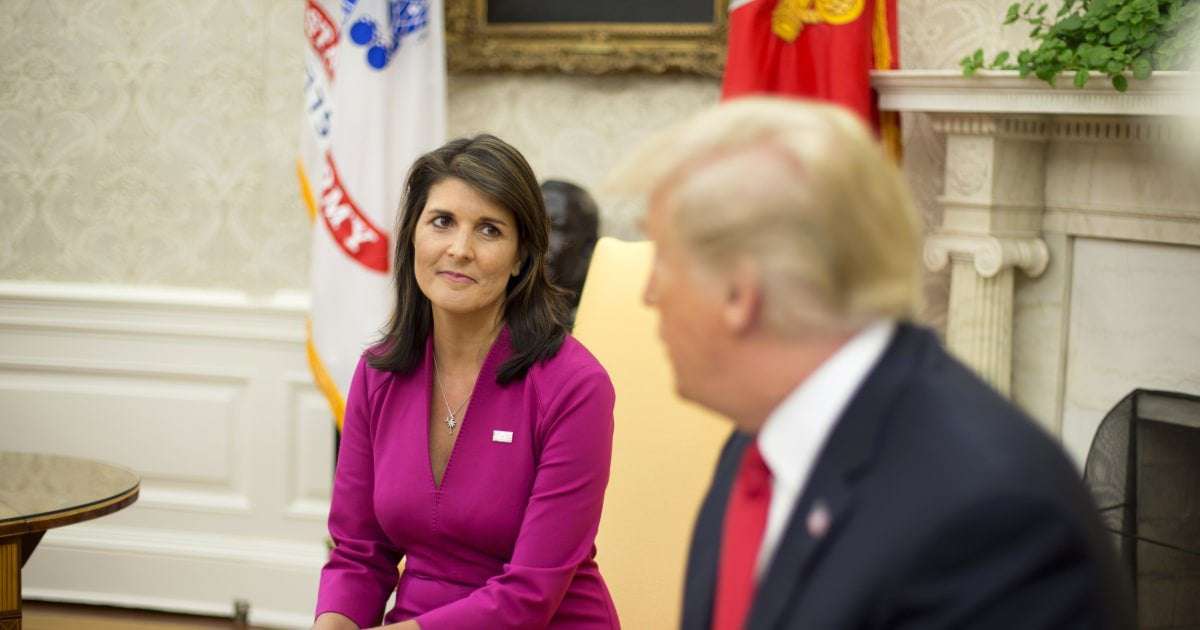There was a curious moment on CBS's "Face the Nation" yesterday in which Major Garrett asked Nikki Haley whether the Trump administration's 2020 deal with the Taliban "set in motion what we're seeing now" in Afghanistan. The former ambassador to the United Nations apparently didn't like the question.
"You know, I think everybody's wanting to go back and talk about Trump," Haley said, quickly changing the subject in her next breath.
As regular readers know, one my favorite scenes in Monty Python and the Holy Grail is the one in which John Cleese's Sir Lancelot, certain he's doing the right thing on behalf of a damsel in distress, storms into a castle during a wedding party, indiscriminately slaughtering most of the guests with his sword. The castle owner, eager to curry favor with Lancelot, urges the survivors to let bygones be bygones.
"Let's not bicker and argue about who killed whom," he tells his few remaining guests.
The scene came to mind watching Haley avoid an important line of inquiry. Asked about the Trump administration's policy toward Afghanistan -- after playing an integral role on Donald Trump's foreign policy team -- the South Carolina Republican effectively said, "Let's not bicker and argue about which administration struck a bad deal with the Taliban, laying the groundwork for future disasters."
Whether Haley wants to avoid the subject or not, the relevance of the Trump administration's February 2020 agreement with the Taliban is unmistakable -- and the former ambassador isn't the only member of the former president's team who isn't at all sure what to say about it.
For those who might benefit from a refresher, the Washington Post published a good summary last week, recapping the basic elements of the deal:
[I]n February 2020, Trump announced that there was a deal. The basic contours: The United States was to get out of Afghanistan in 14 months and, in exchange, the Taliban agreed not to let Afghanistan become a haven for terrorists. The Taliban also agreed to start peace talks with the Afghan government and consider a cease-fire with the government.
Trump, desperate to withdraw, dispatched then-Secretary of State Mike Pompeo to reach an agreement with Abdul Ghani Baradar, a Taliban co-founder the Republican administration helped free from a Pakistani prison. Soon after, the then-U.S. president used the agreement to intensify his drawdown of troops in Afghanistan ahead of his departure from the White House.
The deal's flaws, however, weren't subtle: it set vague goals for the Taliban, with little in the way of enforcement mechanisms. After Trump's electoral defeat, the agreement also left his successor with the untenable choice of a messy, chaotic withdrawal or a military escalation.
And now, prominent voices from the Republican administration are at odds with one another over the agreement Pompeo reached in Doha 17 months ago. As the New York Times reported:
Some former senior Trump officials now call that agreement fatally flawed, saying it did little more than provide cover for a pullout that Mr. Trump was impatient to begin before his re-election bid. They also say it laid the groundwork for the chaos unfolding now in Kabul. "Our secretary of state signed a surrender agreement with the Taliban," Mr. Trump's second national security adviser, H.R. McMaster, said of Mr. Pompeo during a podcast interview with the journalist Bari Weiss on Wednesday.
Lisa Curtis, an Afghanistan expert who served during the Trump administration as the National Security Council's senior director for South and Central Asia, told the Associated Press, "The Doha agreement was a very weak agreement, and the U.S. should have gained more concessions from the Taliban."
And yet, other leading voices on Team Trump have condemned the Biden administration for not hewing closely enough to the same deal some Trump administration officials have condemned. The former president, Pompeo, and former Vice President Mike Pence each insisted last week that Biden didn't do enough to follow the Republican administration's blueprint, which called for a precipitous U.S. exit three months ago.
But they're not just contradicting their former allies; these same voices from the Trump White House are also contradicting reality. Slate's William Saletan wrote a detailed, brutal piece documenting Pompeo's role, explaining that the former secretary of state "laid the groundwork for the Taliban takeover." The piece added, "[N]obody has lied more about the Afghan collapse than Pompeo. At every stage, he aided the Taliban and sabotaged the Kabul government. And now he dares to blame others."
Nikki Haley is annoyed that "everybody's wanting to go back and talk about Trump." With the benefit of hindsight, it seems everybody should talk about the extent to which the Trump administration created the conditions that Team Trump is so eager to complain about now.

CineasOfThessaly on August 23rd, 2021 at 13:44 UTC »
Why do they bother? All they have to do is say their deal was perfect and Biden ruined it and everyone who would ever vote for Trump will believe it.
CainPillar on August 23rd, 2021 at 13:36 UTC »
No, they don't struggle to defend. Instead they try to rewrite history, reaching out to those willing to ignore any and every piece of fact.
BillySlang on August 23rd, 2021 at 12:47 UTC »
He met with them, brokered a (failed) peace deal, accepted at face value that Al Queda had separated from them, and freed 5000 soldiers whom re-armed to take Afghanistan back. There’s no defending that.
Edit: he also called them, “good fighters,” and some other shit.